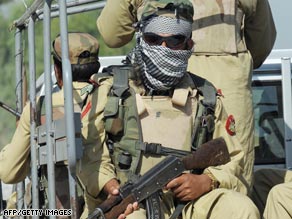WASHINGTON — The big idea behind the Obama administration’s long-in-the-making policy for Afghanistan and Pakistan was that the two countries are inextricably linked. The key to stabilizing Afghanistan, the White House concluded five weeks ago, is a stable and cooperative Pakistan.
Readers' Comments
Readers shared their thoughts on this article.
That calculation has been utterly scrambled by the Taliban offensive in western Pakistan, which has forced the United States to concentrate on the singular task of preventing further gains in Pakistan by an Islamic militant insurgency that has claimed territory just 60 miles from Islamabad.
“We’re no longer looking at how Pakistan could help Afghanistan,” said a senior administration official, who spoke on condition of anonymity because of the sensitivity of the situation. “We’re looking at what we could do to help Pakistan get through this period.”
President Obama and his top advisers have been meeting almost daily to discuss options for helping the Pakistani government and military repel the offensive. But those conversations are complicated by deepening doubts within the administration about Pakistan’s civilian and military authorities, and by resistance in Congress, which has attached strict conditions to $400 million in American aid to buttress Pakistan’s counterinsurgency capabilities.
On Thursday, Secretary of State Hillary Rodham Clinton and Defense Secretary Robert M. Gates went to Congress to warn that unless American military aid can be accelerated, Pakistan will run out of money to finance operations against militants by the middle of this month.
In asking for more money, Mr. Gates pledged that he would soon provide Congress with specific goals, or benchmarks, to judge future progress in Pakistan. He said the goals would be “pretty elaborate” and fall into three categories: security, development and governance.
After days of rising alarm on the part of American officials, Mr. Gates tried to strike a more sanguine tone, noting that the Taliban move into the district of Buner, near Islamabad, had “set off an alarm bell” in Pakistan.
“I think they have seen the situation in the west as largely of our making as we drove the Taliban out of Afghanistan,” Mr. Gates said of Pakistan’s leaders, “and now they’re beginning to see these guys have designs on the Pakistani government.”
The $400 million being sought by the administration would provide Pakistani troops with night-vision goggles and upgraded equipment for its helicopters, among other things. A senior administration official said this week that Pakistan had agreed in the last month to accept American training of some of its counterinsurgency fighters, but only outside Pakistan, to avoid further nationalist anger.
The plan would involve sending officers of Pakistan’s Frontier Corps somewhere in the United States to train in the guerrilla tactics necessary for fighting militants in the tribal areas. The officers would return to Pakistan and train larger numbers of troops there.
But better equipment and training are only part of the solution, American officials said. Pakistan, they said, needs to shift many more army troops from its eastern border, with India, to the west.
Pakistan has not lost international support. A recent donors’ conference in Tokyo raised $5.3 billion in pledges, including $1 billion by the United States and $700 million by Saudi Arabia. But a senior European diplomat said the conference served only to underscore the disarray in the country, since it was not clear where, or on what, the aid could be usefully spent.
The degree of American concern will be laid bare next week when the leaders of Pakistan and Afghanistan travel to Washington for meetings at the White House and State Department. The so-called trilateral sessions are likely to be dominated by worries about Pakistan, officials said, though Pakistani officials have warned against what they have suggested has been an American overreaction.
“This is not South Vietnam,” said Husain Haqqani, Pakistan’s ambassador to the United States. “The Taliban need to be fought, but they’re not about to take over Pakistan and overcome a one-million-strong military.”
American counterterrorism analysts said that militant groups were putting up stiff resistance against the military’s counteroffensive in Buner, and that it was unclear whether Pakistan Army and paramilitary troops would succeed in driving out the militants.
“The security situation is tense, and there are a series of militant networks still in the district,” said Seth Jones, an analyst at the RAND Corporation who visited Pakistan last week. “Until these networks are co-opted or destroyed, however, I am skeptical that the security will permanently improve.”
The administration’s “nightmare scenario,” in the words of one official, is a convergence of the Taliban insurgents in the tribal areas of northwest Pakistan and local militant groups in Punjab.
Such an alliance is suspected to be behind the deadly assault in March on the Sri Lankan cricket team in Punjab’s capital, Lahore, and the bombing last fall of the Marriott Hotel in Islamabad.
“If the Punjabi militants gain ground, if they merged with the Taliban, it would be a terrible problem,” said the official.
A new report on terrorism trends issued Thursday by the State Department provided fresh evidence of the deteriorating security situation in Pakistan during the past year.
The number of attacks against noncombatants in the country doubled to 1,839 last year from 890 the year before, according to statistics compiled for the report by the National Counterterrorism Center. In those attacks, 2,293 people were killed in 2008, compared with 1,340 in 2007.Full Story: http://www.nytimes.com/2009/05/01/world/asia/01policy.html?ref=world



